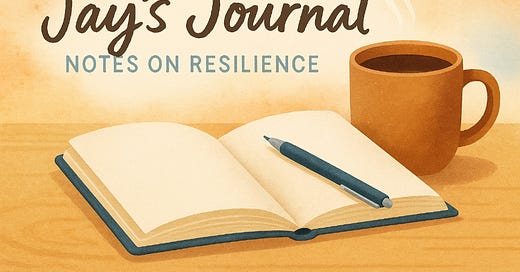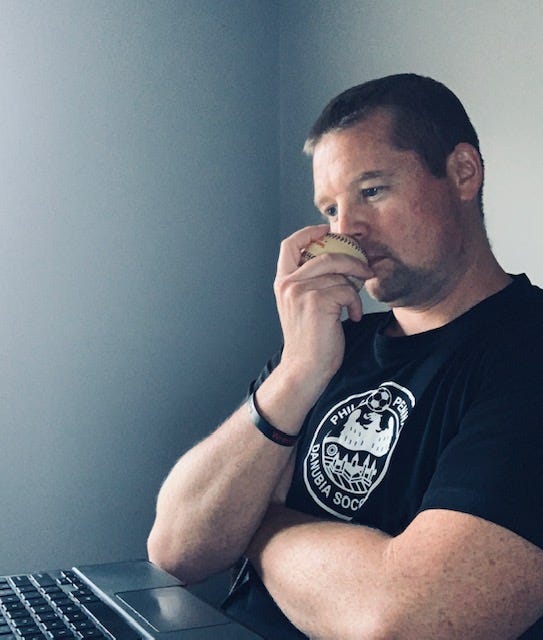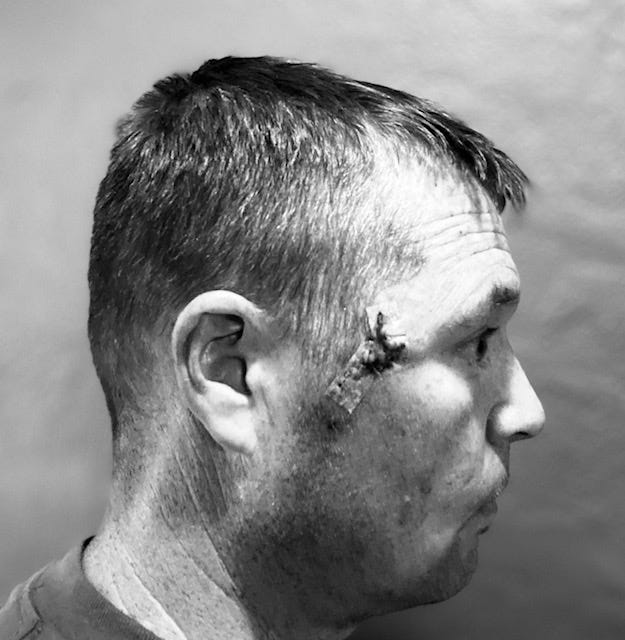👟The Uncomfortable First Step (Also Known As Acceptance)
Let me tell you something I never wanted to admit—especially not to myself.
Acceptance isn’t soft. It’s not passive. It doesn’t wear a bathrobe and whisper affirmations into herbal tea.
No, acceptance is gritty. It’s loud. It’s the moment you stop begging your life to look different and start living the one that’s actually yours. Spoiler alert: mine came with a rollator and a brain that forgets which side is up.
I didn’t stumble into resilience because I’m brave or noble or full of “inspirational quotes.” I got there because I had no other choice. The real turning point? It wasn’t when I started physical therapy. It wasn’t when I learned to laugh at myself as I zigzagged down the hallway like a drunk flamingo. It was the moment I stopped waiting to get “better” and started learning how to live with what is.
And trust me, it’s not some grand, cinematic moment. It’s more like sitting on the edge of your bed with a heating pad and muttering, “Okay. This is my life. Let’s figure it out.”
That’s acceptance.
Not giving up. Not giving in.
Just… getting real.
Because resilience? It doesn’t begin in some triumphant comeback scene. It begins in the quiet, messy, uncomfortable decision to stay. To feel. To adapt. To be—right where you are, limitations and all.
You can’t be resilient if you’re still fighting reality like it’s your personal enemy. I know, because I tried. For years. I negotiated with my diagnosis like it was a moody landlord: I’ll rest more if you stop making me trip in public. Deal?
It never worked. Because the truth is, resistance drains you. But acceptance—that’s where the energy comes from. That’s where creativity shows up. That’s where humor sneaks in. That’s where you find the version of yourself who isn’t defined by what you’ve lost—but by what you’ve built in the ruins.
So if you’re in the thick of it—still bargaining, still wrestling, still hoping to “get back to normal”—I see you. I’ve been you.
But when you’re ready, there’s another way through.
It’s not easier. But it is lighter.
And it starts with two honest words:
This is happening.
Then? You get to work.
You build a life.
You crack a joke.
You take a nap.
You move forward—not in spite of your reality, but because you’ve finally made peace with it.
And let me tell you, peace is a much better co-pilot than denial.
📝 9 Notes
A few things I’m learning, forgetting, relearning—on parenting, judgment, resilience, love, and finding humor in the chaos.
Being a disabled parent means your kid learns early that strength doesn’t always look like running marathons. Sometimes it’s rolling into the room with snacks and sarcasm.
Other people’s judgments say more about their comfort level with vulnerability than your choices.
Let them squirm. You’ve got enough going on.Resilience isn’t a performance.
It’s not the inspirational poster version of you. It’s the one that shows up, tired and honest, and keeps going anyway.Love is showing up when it’s inconvenient.
Also: carrying a barf bucket, waiting in doctors’ offices, and not flinching when someone says they’re scared.I used to think asking for help was weak. Now I think it’s just efficient.
Outsource the ego. It’s not doing much anyway.Kids don’t need perfect parents. They need present ones.
(And snacks. So many snacks.)There’s strength in admitting you’re struggling.
I call it “emotional weightlifting.” Heavy, but worth it.Laughter isn’t a distraction. It’s medicine with a better aftertaste.
I’ve survived entire medical appointments on sarcasm and inappropriate metaphors.You are allowed to take up space exactly as you are.
Even if you walk with a rollator. Even if your speech is slower. Even if your energy is rationed like 1940s sugar. You’re still here. Still worthy. Still full of fire.
💌 Know someone who needs this?
Forward this newsletter to a friend, a fellow weary warrior, or that one person who gets it. You never know who’s sitting quietly, waiting to feel seen.
And hey—if they roll their eyes at emotional honesty and self-deprecating wisdom, that’s okay. Forward it anyway. You’ll be doing your part for the greater good (and possibly annoying them just enough to spark reflection).
Or check out my books—resilience looks great on your nightstand!
Soft Pants👖 Strong Spirits 🔥Can't Lose!
🎙️ Episode 69: One Line, One Love
In the very first episode of our new series exploring the lost (and wildly underrated) art of oral storytelling, Gail opens with a true story about her dog and a lost woodchuck that’s equal parts tender and gut-punchy. And Jay? Jay does what Jay does best—asks the kind of question that sneaks up on you and won’t leave you alone:
What are you afraid to let go of?
This week, we dig into how telling our stories out loud—voice shaking, heart racing, maybe laughing mid-sentence—isn’t just healing…it’s an act of resilience. It’s how writers practice, explore, and build trust with their own truths.
This episode is for anyone who’s ever written to survive, spoken to feel seen, or needed a reminder that your voice matters—exactly as it is.
Jay Armstrong is an award-winning author and speaker who refuses to be defined by his diagnosis of a rare neurological disease. Despite challenges with movement, balance, eyesight, and speech, Jay continues to press forward with determination, humor, and hope. As the leader of the Philadelphia Ataxia Support Group, he’s dedicated to helping others find joy, peace, and meaning in their lives, no matter the obstacles they face.










This newsletter is full of wisdom, Jay. At 66, I'm practicing a lot of acceptance. I didn't expect to have the (MINOR) limitations I'm experiencing until I was well into my 70s. Then I look at someone with REAL limitations at a younger age and think I have it pretty good. By sharing your journey, you teach us all about ourselves. Thanks.
I think I need a root canal. I keep telling myself every time I bite down on a an uneven piece of food or eat/drink something cold and receive a jolt of pain: "This might resolve itself on its own if I wait it out. "
Then I remember a novel I read years ago... I think it was called The Red Tent. It was set back at a time before dentists were a thing. I remember the women in the tent were happy when their teeth finally fell out because the pain stopped. Well... Times have changed!
I have a dental appointment on Tuesday. 🤩
Acceptance is indeed gritty business.
And so much of it hinges on the stories we tell ourselves.